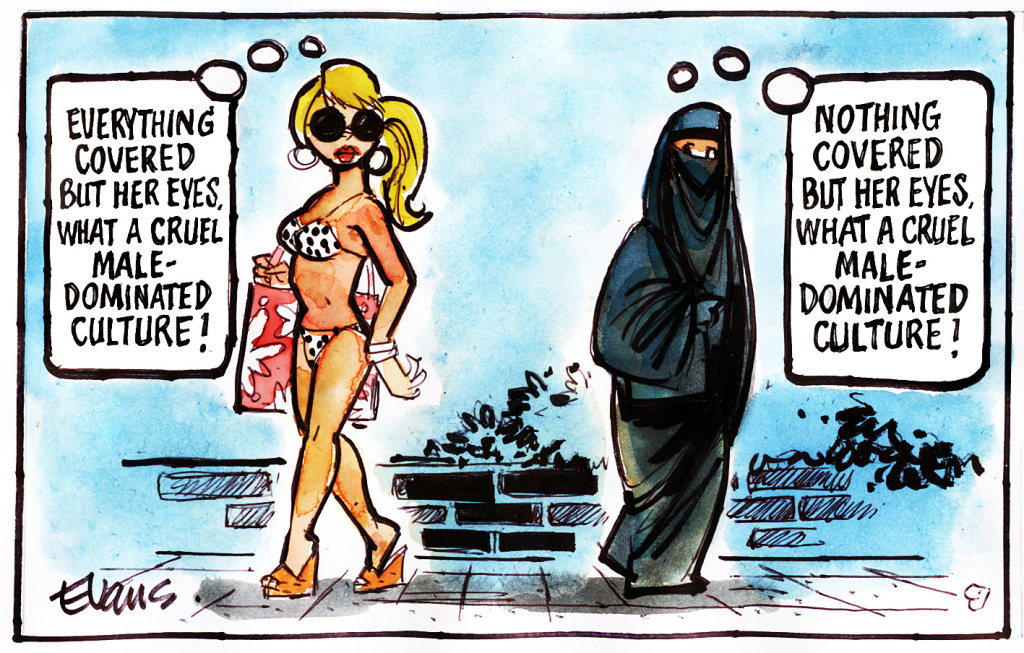Feminism, What Women Wear And The Wider Implications
The issue of what women should, and shouldn’t wear, or be expected what to wear and not to wear is sensitive. And being a man, I can assure you I’m not going to write something controversial just to get attention.
However, I do feel like we need to talk about the wider implications of this subject. I don’t know about anyone else, but the conclusion that I have reached is that what women wear really is none of my business. Whether it is a bikini or a full blown burqa, the important thing is that they have the choice. Even talking about certain “codes of conduct” that differ from the standards that men are put under assumes an unjustified control over women’s freedom.
And this brings us to the above cartoon. This cartoon illustrates very well some of the discussions that surround this issue. And I have had conversations with all kinds of people who have a view to share:
Some women who wear the burqa (full covering), veil (covering the face) or the hijab (covering the hair) genuinely do so out of choice, but some will argue that they are all “brainwashed” and made to feel ashamed that they may attract the attention of men. Some arguments can be made against that, but I won’t go into it as it is not relevant to the article.
On the other hand, Muslim women (and I am sure some Orthodox Christian and Jewish, among others as well) will argue that no, it is the other way round. While being allowed to wear whatever you want is good, it almost always ends in objectification, and that most women will bow down to societal pressure. This is not saying that feminists are not aware of this – of course, they equally battle the concept of objectifying women’s bodies and issues surrounding misogyny.
The wider implications
While this may be taken as an oversimplification, if we take the two views presented and ask “who is right?” – the answer is actually both. And in saying that both are right does not mean that women who choose to “cover up” so to speak are stupid, nor does it mean that women who choose to dress more liberally are stupid either. We can discuss, at great length, how to solve the problem and to change the inappropriate societal, political and familial pressures to ensure that a woman’s “choice” is “genuine”. But these factors, good or bad, are still factors of influence. Yet this is not what the article is about.
Put simply, I am a determinist. I believe that all sorts of factors affect the way that we all (not just women), behave. Asides from genetic heritage and the general environment, we also have societal, familial and political pressures. Our very design enables us to be conditioned in certain ways over a long period of time, as it does help in our survival – for example, in observing and doing what our parental figures do when we are children. This is what this feminist issue brought up for me, and this is a conclusion that I came to when I was studying philosophy at university. Although written a long time ago, Arthur Schopenhauer’s Prize Essay on the Freedom of the Will is very relevant, and the idea of determination and free-will is something that I have given a lot of thought since. Indeed, in theory, we could create a computer powerful enough and we could input all the factors at play when a certain individual has to make a certain decision, to make an accurate prediction.
The illusion that we call “free will” is there simply because we just do not understand the world enough to see the intricacies that govern our day-to-day choices and actions. The notion that we are nothing more than “biological machines” who’s genetic design and outside factors determine the way we behave is easier to accept and understand by someone who wholeheartedly believes in the theory of evolution – as opposed to someone who may believe in it, but is also religious.
We shouldn’t despair. Free or determined, we cannot fully confirm until we become technologically advanced enough to predict human behaviour. This might come to pass, or it might not, but our ignorance in this matter truly is a blessing, even if I do believe that we are determined.
But the most important part of believing in determinism is looking at the world in a new way. It is a prism in which we are encouraged – maybe even forced – to start looking at root causes of certain things, be they actions of individuals or society at large. The notion of creating “the other side” when dealing with an issue, and then painting it as “evil” becomes amusing. While some people may fear the slippery slope of nihilism (the idea that morality doesn’t objectively exist, and its simply subjective), that is not the case for me. We can still employ the gifts of empathy, sympathy and cooperation to logically justify why we must be tolerant and accepting of others. And what we can accept most of all is that, truly, we have no choice.
So the next time we are presented with horrible actions by individuals or society, we might have an initial emotional reaction and be more predisposed to painting something as “evil”. But we could also overcome that and look at the root cause of such horrible actions to produce genuine and long term solutions. As opposed to descending into violence and instability. It will help us also to be more open minded, not to only understand, but also appreciate why some people believe differently to what you or I believe.

